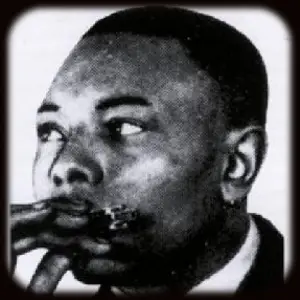JAZZ GILLUM
 While John Lee ‘Sonny Boy’ Williamson was the undoubted King of the Chicago harp players in the 40s, Jazz Gillum was the big noise there many years before him. As part of Lester Melrose‘s stable of session musicians, Jazz performed on hundreds of ARC and Bluebird recordings, and his long partnership with Big Bill Broonzy placed him firmly at the heart of the Chicago scene in the 20s and 30s.
While John Lee ‘Sonny Boy’ Williamson was the undoubted King of the Chicago harp players in the 40s, Jazz Gillum was the big noise there many years before him. As part of Lester Melrose‘s stable of session musicians, Jazz performed on hundreds of ARC and Bluebird recordings, and his long partnership with Big Bill Broonzy placed him firmly at the heart of the Chicago scene in the 20s and 30s.
William McKinley Gillum was born in 1904 in Indianola, the same small Mississippi town where BB King was born 21 years later. He began to play the harp as a young boy, and he left home at the tender age of seven to live with relatives in Charleston MS where he played on street corners for spare change. When he visited Chicago, his playing caught the popular mood and when he bumped into guitarist Big Bill Broonzy, they found that their musical styles blended well. This was the beginning of a beautiful friendship, and the two men played together continually until WWII.
Jazz’s ‘Reefer Headed Woman’ with maybe the first electric guitar solo;
Jazz’s recording career began when he backed Big Bill on his first sessions in the late 20s and also with Big Bill’s half-brother Washboard Sam, a prolific, amusing songwriter and a great singer. Jazz made his first records as a leader in 1934 for the ARC label where his good-time music sold very well. Jazz was not a great composer, but he could spot a good song, sing it well and blow a great harp line over it, so although he wasn’t a big star, he recorded over 100 tracks, mostly for Bluebird. His 1938 song ‘Reefer Headed Woman’ featured one of the earliest examples of electric guitar, played by George Barnes. Jazz recorded hundreds more tracks as a side-man, as Lester called him into the studio to back great Bluebird artists like Memphis Minnie, Lil Green, Memphis Slim and Lonnie Johnson.
Jazz recorded ‘Key to the Highway’ before Big Bill, who was playing guitar;
When the USA joined WWII, Jazz was drafted but by the time he was discharged at the end of the War, the music of Chicago had changed. Blues was turning to a hard-edged electric sound and Sonny Boy Williamson had transformed the harp from a ‘texture’ instrument to a leading feature of Blues bands. Jazz recorded a few tracks for Bluebird before it folded in 1948, and a few more for Vocalion, but after that he drifted from the scene. He was silent throughout the 50s, returning for a session with Memphis Slim on his ‘USA’ album in 1961. Nothing more was heard from Jazz Gillum until July 1966, when it was reported that he had died from gunshot wounds received during a street argument in Chicago.